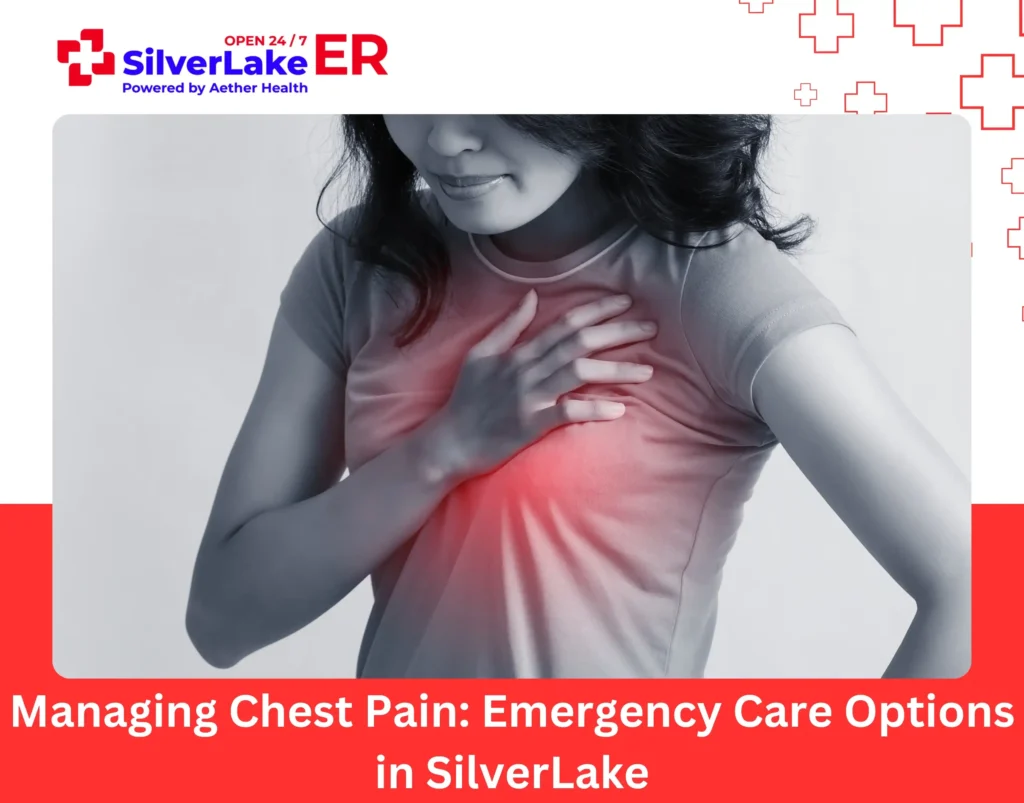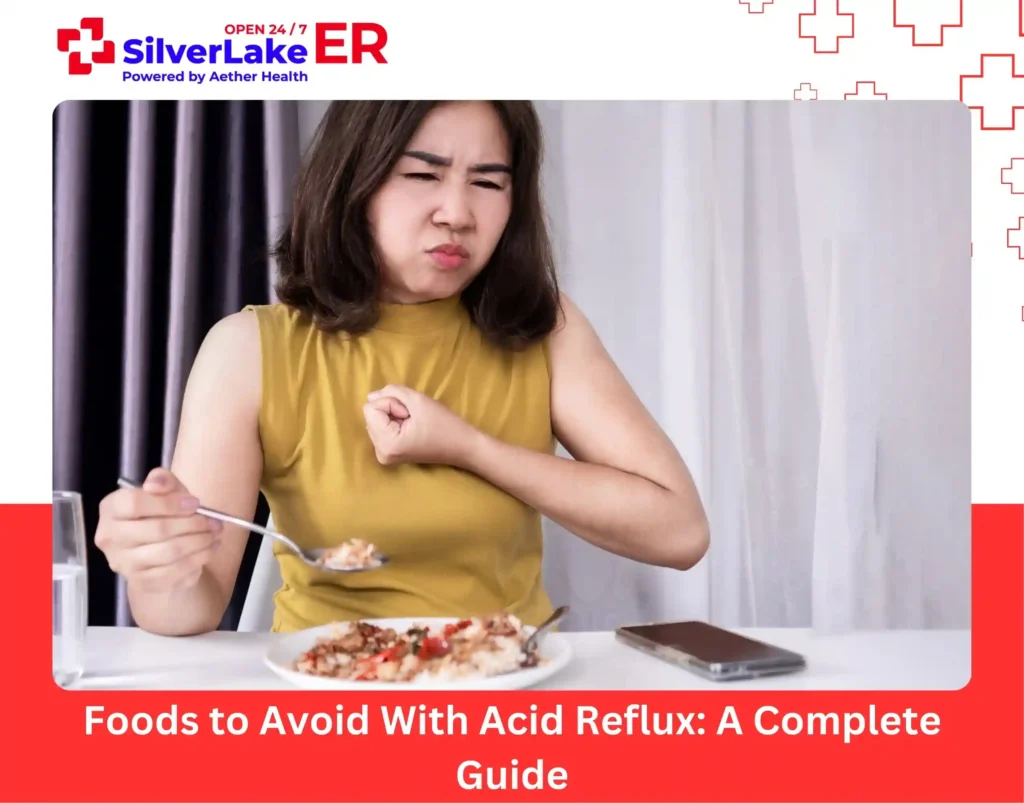Most chest pain sufferers wait an average of three hours before seeking emergency care. This delay can significantly impact survival rates and recovery outcomes.
Chest pain often stems from various causes, from cardiac conditions to musculoskeletal issues. While getting an accurate diagnosis within the first hour of symptoms can significantly improve treatment outcomes, many struggle to identify when their chest pain warrants immediate medical attention.
This guide will help you recognize emergency chest pain symptoms and understand the evaluation process at the Silverlake ER.
Understanding Chest Pain
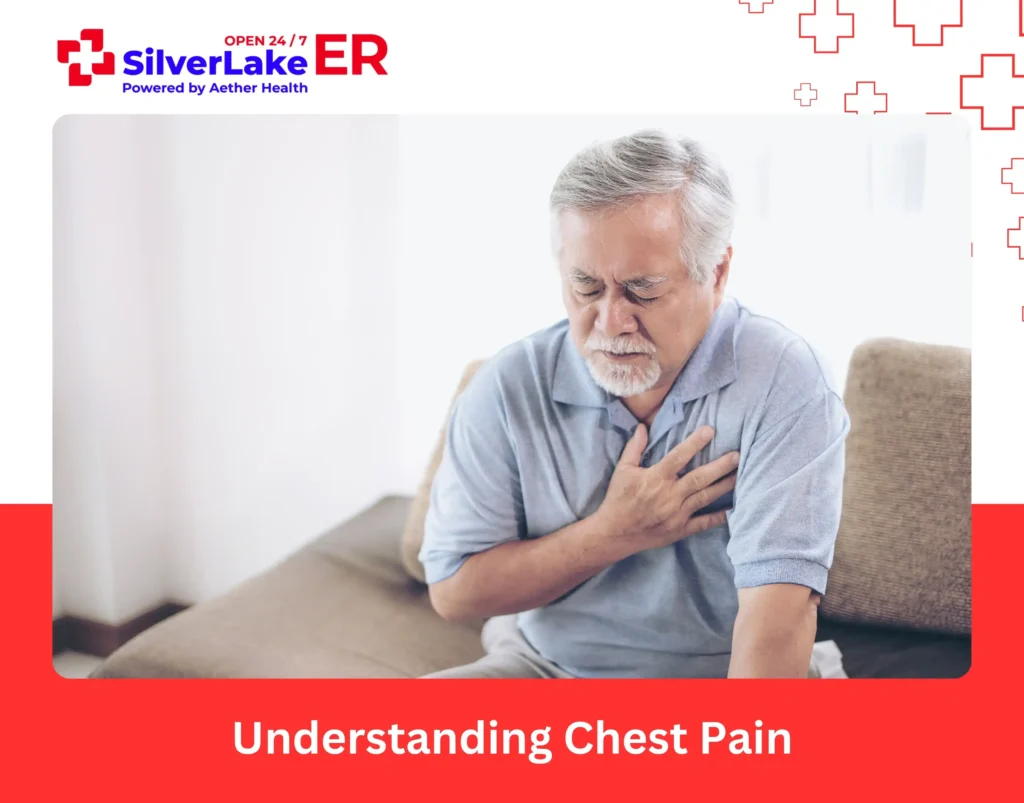
Chest pain can manifest in various forms, such as sharp, dull, burning, or pressurelike sensations. The duration of this discomfort may range from seconds to minutes, or it may persist for several hours. While certain occurrences may be benign, others require immediate medical attention.
Cardiac-Related Causes
Heart Attack (Myocardial Infarction)
Chest pain associated with a heart attack typically presents as a crushing or squeezing sensation, often radiating to the arm, jaw, neck, or back. Additional symptoms may include shortness of breath, nausea, and dizziness.
Angina
Resulting from decreased oxygen supply to the heart muscle, angina appears as a sensation of pressure or tightness in the chest, generally triggered by physical activity or stress, and is typically relieved by rest or medication.
Pericarditis
Inflammation of the heart’s protective sac leads to a sharp, stabbing chest pain that worsens when lying down or taking deep breaths, often accompanied by a notable friction rub sound during examination.
Aortic Dissection
A rare yet life-threatening condition characterized by a tear in the inner layer of the aorta, causing immediate, intense chest pain that often radiates to the back, necessitating urgent emergency care.
Lung-Related Causes
Pulmonary Embolism
A blood clot in the lung artery manifests as sudden, intense chest pain, rapid breathing, shortness of breath, and sometimes coughing up blood, requiring urgent medical intervention.
Pneumonia or Pleurisy
Infections and inflammation within the lungs can result in sharp, localized chest pain that aggravates with deep breaths or coughing, often accompanied by fever and a productive cough.
Pneumothorax (Collapsed Lung)
The sudden escape of air into the pleural space leads to severe chest pain and breathing difficulty, typically following trauma or lung conditions.
Gastrointestinal Causes
Acid Reflux (GERD)
The burning feeling from stomach acid backing up into the esophagus can mimic heart-related chest pain, often worsening after meals or when lying flat.
Esophageal Spasms
Intense, sporadic contractions of the esophagus can create severe, heart attack-like chest pain, frequently triggered by swallowing.
Gallbladder Disease
Gallstones can cause intense upper abdominal discomfort that radiates to the chest, especially after consuming fatty foods.
Musculoskeletal Causes
Costochondritis
Inflammation of rib cartilage leads to localized, tender chest pain that worsens with movement or palpation, often confused with cardiac pain.
Muscle Strain
Injury or overuse of chest muscles can result in discomfort that is aggravated by certain movements or deep breathing.
Psychological Causes
Panic Attacks
Episodes of intense anxiety may lead to chest pain, rapid heartbeat, sweating, and shortness of breath, often mimicking heart emergencies but linked to psychological stress.
When to Seek Emergency Care
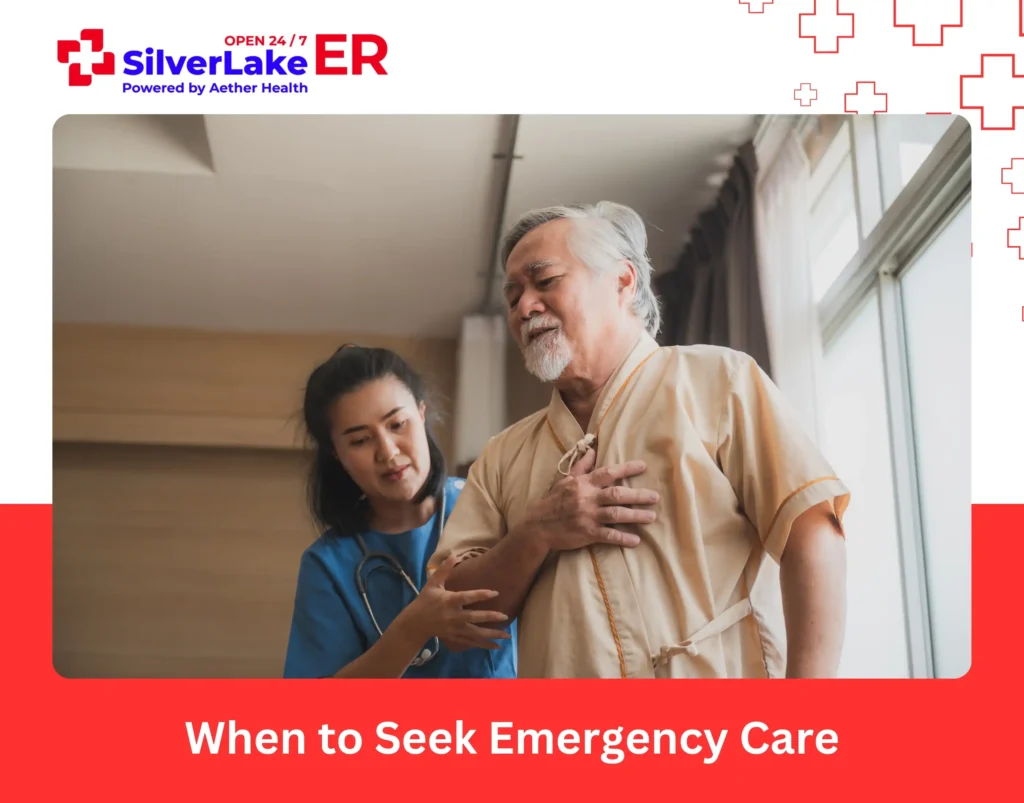
Certain signs suggest that chest pain requires immediate medical intervention. Dial 911 or proceed to the nearest emergency department if you experience:
- Severe or Prolonged Chest Pain – Any intense discomfort in the chest lasting more than a few minutes, particularly if it does not alleviate with rest, requires urgent assessment.
- Pain Radiating to Other Areas – If the pain extends to the arms, jaw, neck, or back, it may indicate a potential heart attack.
- Shortness of Breath – Difficulty breathing in conjunction with chest pain could signify cardiac or pulmonary issues.
- Dizziness or Fainting – Lightheadedness or sudden loss of consciousness may accompany serious cardiovascular conditions.
- Cold Sweats and Nausea – These symptoms, especially when combined with discomfort, suggest a possible cardiac event.
- Sudden, Tearing Pain in the Chest or Back – Aortic dissection manifests with a severe, tearing sensation and necessitates immediate surgical intervention.
- Coughing Up Blood – This may indicate a pulmonary embolism or lung infection, both of which require emergency care.
- Pain Worsening with Breathing or Movement – While this could be musculoskeletal, it is essential to rule out pulmonary causes.
How Emergency Rooms Diagnose Chest Pain
At the emergency room, physicians conduct various tests to identify the cause of chest discomfort, including:
- Electrocardiogram (ECG/EKG): Assesses the heart’s electrical activity to find irregularities.
- Blood Tests (Troponin Levels): Detect heart injury by assessing cardiac enzymes.
- Chest X-ray: Investigates lung issues, fractures, or anomalies.
- CT Scan: Aids in spotting blood clots, aortic tears, or lung problems.
- Echocardiogram: Employs ultrasound to evaluate heart function and identify fluid accumulation.
- Stress Test: Evaluates heart performance under physical exertion or medication-induced pressure.
Managing Chest Pain at Home
If chest discomfort is mild and not an emergency, certain measures may assist in symptom management:
- Rest and Monitor Symptoms: If the discomfort is mild and non-cardiac, rest and track any changes.
- Try Antacids for GERD: If heartburn is suspected, antacids or acid-reducing medications may provide relief.
- Practice Relaxation Techniques: If anxiety or panic attacks are involved, controlled breathing can assist in symptom alleviation.
For severe chest pain or pain that spreads to the jaw, arms, neck, or back, visit the emergency room immediately.
Preventing Emergencies Related to Chest Pain
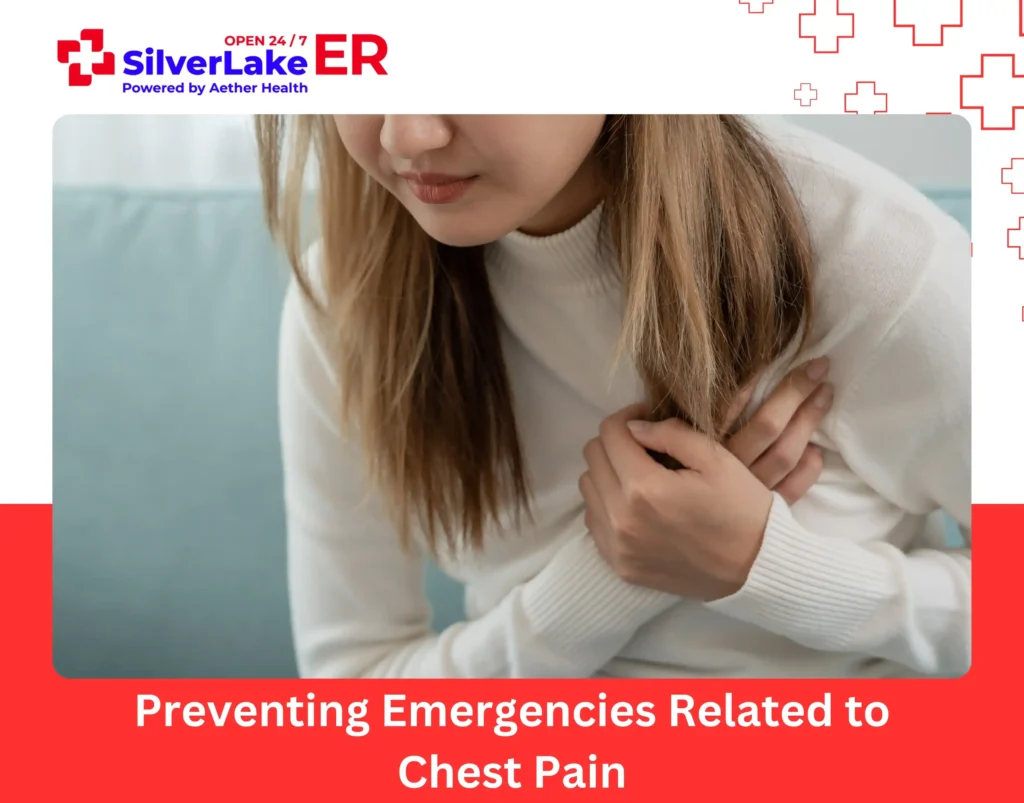
While not all chest pain is preventable, lifestyle changes can reduce risks associated with cardiac and respiratory conditions:
- Follow a Heart-Healthy Eating Plan: Consume nutrient-dense foods, limit processed items, and decrease saturated fat consumption.
- Engage in Regular Physical Activity: Aim for at least 150 minutes of moderate exercise weekly to support cardiovascular health.
- Manage Stress Levels: High stress contributes to heart disease, utilize relaxation methods like meditation and yoga.
- Quit Tobacco Use: Smoking harms the heart and lungs, heightening the risk of severe illnesses.
- Control Ongoing Health Issues: Manage diabetes, hypertension, and cholesterol with medical advice.
- Recognize Initial Warning Indicators: Being aware of when to seek medical help averts delays in critical moments.
Chest pain is a critical symptom that requires careful attention and timely action. Recognizing the signs of potentially serious conditions, such as heart attacks or pulmonary embolisms, is essential for prompt medical intervention.
With advanced diagnostic capabilities and a skilled medical team, Silver Lake ER offers 24/7 emergency care to assess and address chest pain effectively.
If you or someone you know experiences chest discomfort, shortness of breath, or other concerning symptoms, seek immediate care at Silver Lake ER without delay.
FAQs
How to manage chest pain in an emergency?
If you’re experiencing chest pain in an emergency situation, the first step is to call 911 immediately. While waiting for emergency services to arrive, chew an aspirin (unless you’re allergic) to help prevent blood clotting. Try to stay calm and rest until help arrives.
How to cure chest pain due to gas?
To relieve chest pain caused by gas, avoid consuming foods that produce gas, such as beans, carbonated drinks, and certain vegetables. You can also take over-the-counter antacids to neutralize stomach acid and drink peppermint tea to soothe your digestive system.
How to relieve angina quickly?
If you’re experiencing angina, it’s crucial to rest and avoid any stress triggers. Take your prescribed angina medication as directed by your doctor. They can help relax and widen blood vessels, improving blood flow to the heart and providing quick relief.

